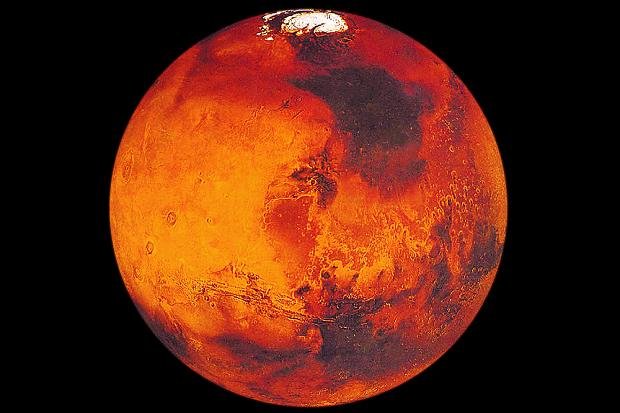
(Source)
I posted the first part of this discussion a few days ago and received a lot of positive support and comments. In that post, I promised that my next post (this one) would outline the case for going to Mars before the Moon. However, in the process of researching that argument, I realized that I don't really feel there is a convincing case for going to Mars before the Moon, just a convincing one as to why we should ultimately make our way there. For the sake of a well-rounded discussion, I'll outline what I've found to be the overall rhetorical push for Mars (and simultaneously continue my argument for why the Moon should come first.)
Overall Argument
A Resemblance to Earth-
Mars pulls on the heartstrings of humanity's sentimentality. In Mars, we see Earth as it might have been. It has a 24.6 hour day, polar caps, volcanoes, sand dunes, and (former) riverbeds. Evidence continues to build for the argument that Mars once had flowing water on its surface. If not for the destructive effects of a perpetual solar wind, it might even have had an atmosphere quite similar to that of Earth. Its gravity is 2.7 times less than that of Earth but significantly stronger than the Moon's 6.1 times less than that of Earth. Both planets have seasons. It's easily the most similar planetary body in the solar system.
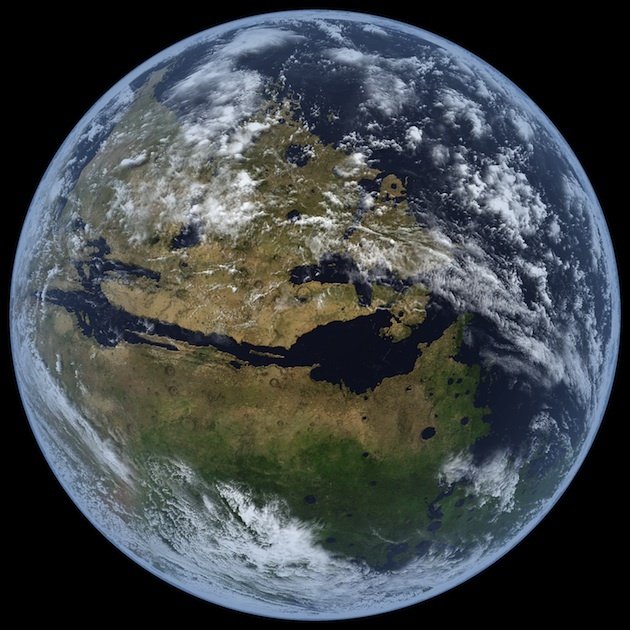
How a terraformed Mars might look - (Source)
I think this is an absolutely valid reason to colonize Mars (in the long run). In terms of similarity, if Mars is your neighbor, then the Moon might not even live in the same state. However, sentimentality should not drive humanity's space exploration if colonizing it is more expensive and unfeasible with current technologyAn Atmosphere
Mars offers something that the Moon (currently) simply does not: protection against radiation. While Mars' atmosphere is significantly thinner than that of the Earth, it is better than the Moon's non-existent one. However, this is not a particularly strong reason because the amount of protection offered by Mars' atmosphere would still result in exponentially higher exposure to solar radiation than on Earth.
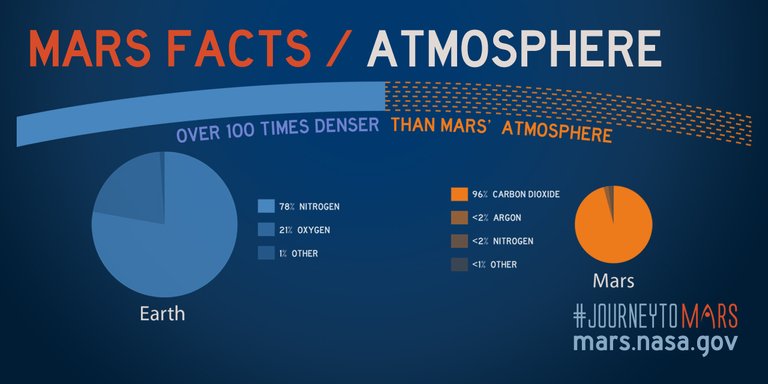
Mars' atmosphere - (Source)Availability of life-sustaining compounds-
Mars has significantly more carbon, nitrogen, hydrogen, and oxygen than the Moon. Further, while the Moon potentially has stores of ice water in the permanently shaded areas of its poles, it's limited location could serve as a serious roadblock to extensive settlement (unless we were to terraform the Moon, but that's an entirely different argument.) Mars also has significantly more metals than the Moon (notably copper), which would in the long term make it more economically valuable. As a counter-argument, the value of colonizing the Moon doesn't lie in the possibility of full-moon colonization and lunar mining (which does actually have some value), but rather the scientific advances that establishing a permanent lunar base might yield.
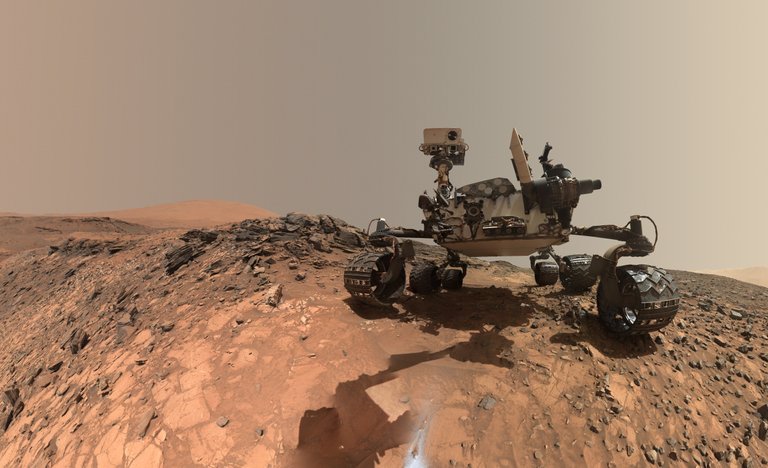
Much of our knowledge of the composition of Mars has come from rovers like Curiosity - (Source)The Survival of the Human Race-
Ultimately, the main argument we continuously hear for why we should colonize Mars is that we need, as Elon Musk recently put it, a "backup drive." The Earth is becoming a more dangerous place the longer we live on it. Explosive population growth, rampant global warming, melting polar ice caps, it seems unlikely that the Earth's surface will look the same in 100 years as it does today. According to Stephen Hawking,
If the human race is to continue for another million years, we will have to boldly go where no one has gone before.
Conclusion
Fair enough. The point that humanity needs to expand to thrive, or at least survive, is well made. But that is not a reason to go to Mars before the Moon. Humanity needs a logical and well laid-out game plan for expanding into the solar system. Science isn't built on hopes and dreams, but on logic and hard work (although hopes and dreams play their role in inspiring people to become scientists in the first place.)
When it comes down to it, the Moon is closer, easier, and equally valuable in the short term as Mars. What NASA and other space exploration agencies need right now are success and clear progress. These are the only things that can guarantee continued funding and ultimate growth, both of which we will need to have any hope of reaching Mars and ultimately the rest of the universe.
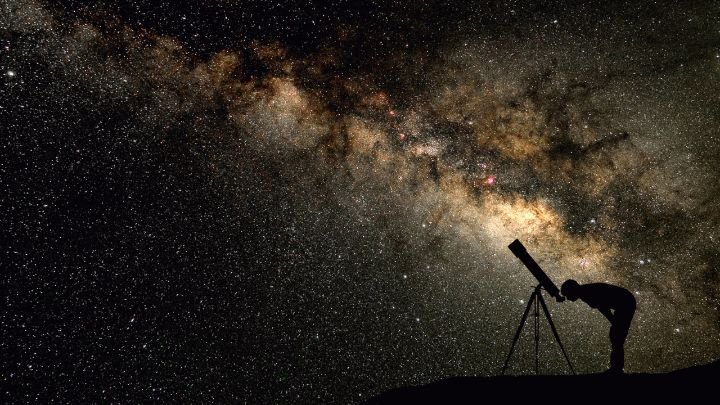
(Source)
Sources
- http://www.nss.org/settlement/mars/zubrin-colonize.html
- http://qz.com/379666/heres-why-humans-are-so-obsessed-with-colonizing-mars/
- http://www.redcolony.com/features.php?name=whycolonizemars
- http://waitbutwhy.com/2015/08/how-and-why-spacex-will-colonize-mars.html
- http://www.space.com/28189-moon-mining-economic-feasibility.html
- http://www.space.com/24731-mars-radiation-curiosity-rover.html
- https://www.newscientist.com/article/dn13748-stephen-hawking-calls-for-moon-and-mars-colonies/
- http://www.thespacereview.com/article/221/1
We also need to decentralize space travel. People like Elon Musk are making great strides in this regard, but we need more inclusion, not tighter regulations. We need to rely less on government-funded programs, which in the near term are likely to take a severe hit when the economic shockwaves from a USD collapse hit, and more on private enterprise. The real trick is going to be finding some way to incentivize this kind of endeavor.
Awesome work man. I completely agree, I think the human race should look to constantly expand across all the physical existence that was created for us to expand out into. There are no limits to what the human race is allowed to accomplish in terms of spreading as far and as wide as we can. I think we will have the technology at some point to travel much further than the Moon or Mars, but that is a solid goal to aim for for the time being. There are major challenges that need to be addressed to travel that far. The real problem is getting the propulsion technology available for the publicly known about space programs. If the propulsion technology does exist or doesn't exist, it has to become a publicly available technology. On a side note, here is a playlist by one of the best amateur filmmakers of all the launches from Florida over the past year in one compiled video:
Awesome video, thanks for sharing. Pretty surreal stuff.
I really like the logic behind colonizing the moon. Unfortunately it doesn't have the sex appeal that going to mars does. I think we could learn a lot from maintaining a moon base, and use that knowledge to better plan for going elsewhere.
As technology is heating up, I imagine that we'll be pursuing both courses in parallel. Assuming that we're eventually going to colonize both locations in some order, different companies will pursue different targets. They'll start using robots to prepare shelters & irrigation on both outposts at the same time, then send people to whichever one is survival-ready first. My guess is that would be the moon for the reasons you have outlined in these posts, but I've been wrong before.
It may be good to go both to Mars and the Moon! After all, this is exploration and exploration is needed for increasing our knowledge (no matter what will be found). At the end, the key decision will be taken on the basis of available money (as usual!).
Thanks for sharing these two very objective posts!
I absolutely agree we should go to both, but also that we should focus on one at a time. We barely have the resources to accomplish one of these goals, let alone both at the same time!
I agree :)
Vacuum is not good place for humans. I aggree that we need to explore , but we don't know how many species we have here on Earth , we don't know all species in oceans and seas. I would first like to explore human body to the fulest, then find the way to heal or reproduce damaged parts of it. Then after that send us to where you want. Second is efficient interplanetary travel. We can not sustain this gravity shoots and impulse driven rockets that we have today. We need something more .
Who took the picture of the supposed Mars rover? A martian?? I think they should first try to fly all the way across Antarctica. Prove that the earth can be circumnavigated from north, to south, to north again. It's never been done. The moon landing was a hoax. NASA admitted they can't get past the Van Allen belt. Explain why we can see Chicago from the other side of lake Michigan... or why we can see the island of Kauai from Oahu. This supposed curvature only exists in photoshop, cgi, and fish-eye lenses. NASA lies. I'm still waiting for a LIVE VIDEO of the whole earth spinning in space as a ball.. 24/7 live feed. Not these false photochopped pictures with clouds made with the clone tool. I want to the see the whole thing in it's totality spinning in all of it's glory 24/7. They cannot do it.
Amazing.good jobs
We can't. The aliens told us not to come back.
Do you own a telescope? Look at mars. Its a light show its not solid. Space is not real you are under mind control. Look at NASA s original footage of all the Apollo programs and then talk about mars especially Apollo 19 it is fake 100 percent.
yes
Hi @victor-lucas your posts are really fascinating! I was under the impression that Mars's atmosphere was depleted due to not having a strong magnetic field. and thus it is impossible to terraform (other than domes perhaps)...
I have learnt sumtin new from u
Keep it up👍This is awesome @victor Lucas...
Congratulations @victor-lucas! You have received a personal award!
Click on the badge to view your Board of Honor.
Do not miss the last post from @steemitboard!
Participate in the SteemitBoard World Cup Contest!
Collect World Cup badges and win free SBD
Support the Gold Sponsors of the contest: @good-karma and @lukestokes
@victor-lucas you were flagged by a worthless gang of trolls, so, I gave you an upvote to counteract it! Enjoy!!
Congratulations @victor-lucas! You received a personal award!
You can view your badges on your Steem Board and compare to others on the Steem Ranking
Vote for @Steemitboard as a witness to get one more award and increased upvotes!